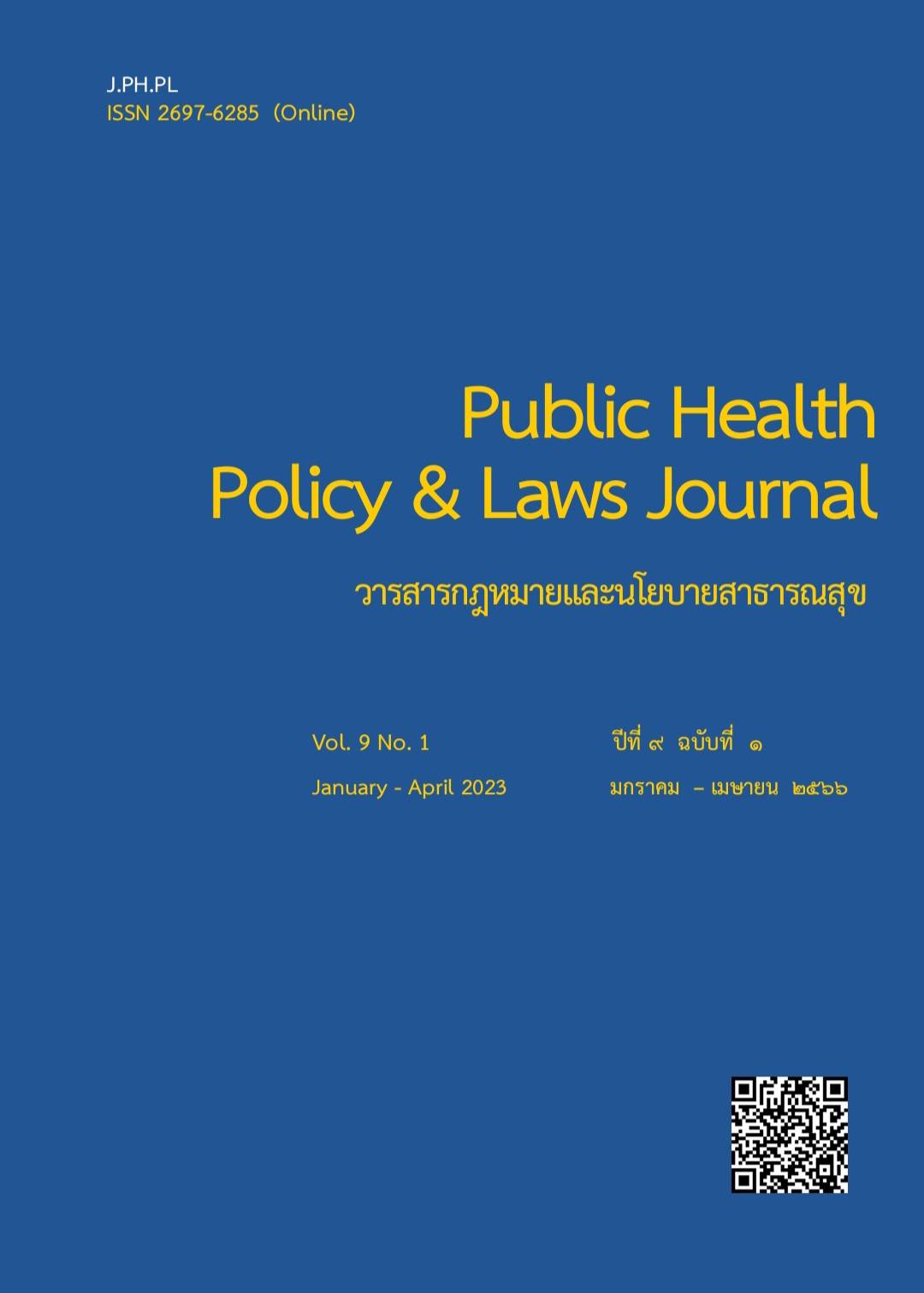Effects of a Health Literacy Program on Knowledge, Attitudes and Rational Drug Use among Public Health Students in Rajabhat Phetchaburi University
Keywords:
Health literacy program, Health literacy, Rational drug use, Public health studentAbstract
This study was a quasi-experimental research, one group with pre and post-test design, aimed to study the effects of a health literacy program on knowledge, attitudes, and rational drug use among public health students in Rajabhat Phetchaburi University by applying the concept of health literacy. The sample consisted of 38 third-year-students of public health degrees who participated in a 6-week health education program for enhancing health literacy. The program consisted of an activity plan that focused on lectures, group discussion, practice and demonstration, and reflection, etc. Data was collected before and after the education program performed. Data was analyzed with frequency statistics, percentage, and Wilcoxon-signed rank test.
The results demonstrated that after the program, the students had knowledge of rational drug use, attitudes towards rational drug use and rational use of drugs with statistical significantly higher than before the program performed (p-value < 0.05).
From these results, it showed that learning programs developed by applying the concept of health literacy was able to build knowledge of rational drug use, improve attitudes towards rational drug use and rational use of drugs in a better direction. Therefore, it should be appropriately applied to develop students’ skills in other groups and in courses related to primary therapy or other courses.
References
เกศราภรณ์ ชูพันธ์, พนิดา พาลี, กานต์รวี คำชั่ง และทวี เรืองโฉม. (2565). ความรอบรู้ด้านการใช้ยาอย่างสมเหตุผลของนักศึกษาพยาบาล วิทยาลัยพยาบาลของรัฐในจังหวัดเชียงใหม่. วารสารวิชาการสุขภาพภาคเหนือ, 9(1), 144-160.
นัชชา ยันติ. (2560). ปัจจัยที่มีความสัมพันธ์ต่อพฤติกรรมการใช้ยาปฏิชีวนะของนักศึกษาหลักสูตรสาธารณสุขศาสตร์ มหาวิทยาลัยแห่งหนึ่ง จังหวัดปทุมธานี.
วารสารวไลยอลงกรณ์ปริทัศน์ (มนุษยศาสตร์และสังคมศาสตร์), 7(2), 57 – 66.
นิธิมา สุ่มประดิษฐ์, เสาวลักษณ์ ฮุนนางกูร, ภาณุมาศ ภูมาศ และภูษิต ประคองสาย. (2555). การสำรวจระบบควบคุมและเฝ้าระวังการใช้ยาปฏิชีวนะและการส่งเสริมการใช้ยาปฏิชีวนะอย่างสมเหตุสมผล : ผลการศึกษาเบื้องต้น. วารสารวิจัยระบบสาธารณสุข, 6(3), 361-373.
พัชราพรรณ กิจพันธ์ และจันทรรัตน์ สิทธิวรนันท์. (2560). ความคิดเห็นของเภสัชกรชุมชนในกรุงเทพมหานครต่อช่องทางและเงื่อนไข ในการจ่ายยาปฏิชีวนะสำหรับใช้ภายนอก. วารสารเภสัชกรรมไทย, 9(2), 338-351.
มาลี คำคง, ภรณิอร พรผลอมร และพีรยา นันทนาเนตร์. (2565). การจัดการเรียนรู้ภาคปฏิบัติทางการพยาบาล เพื่อส่งเสริมการใช้ยาอย่างสมเหตุผล. วารสารเครือข่ายวิทยาลัยพยาบาลและการสาธารณสุขภาคใต้, 9(2), 249-259.
รวีวรรณ เผ่ากัณหา, ธัญญาสิริ ธันยสวัสดิ์ และกาญจนา อยู่เจริญ. (2564). ความรู้ ทัศนคติ และพฤติกรรมการใช้ ยาปฏิชีวนะอย่างสมเหตุผลของนักศึกษาพยาบาล. วารสารพยาบาลทหารบก, 22(3), 143 – 150.
สรัญญ์รักษ์ บุญมสิก, รุ่งนภา จันทรา, และชุลีพร หีตอักษร. (2562). ความรู้ เจตคติ และพฤติกรรมการใช้ยาปฏิชีวนะอย่างสมเหตุสมผลของนักศึกษาพยาบาล เครือข่ายวิทยาลัยพยาบาลและสาธารณสุขภาคใต้. วารสารวิจัยและนวัตกรรมทางสุขภาพ, 2(1), 25 – 36.
สุชาดา ธนภัทร์กวิน, เขมิกา โรจน์ทังคำ และอารียา จิรธนานุวัฒน์. (2562). ผลการให้ความรู้เรื่องการใช้ยาอย่างถูกวิธีในกลุ่มอาสาสมัครสาธารณสุข กรุงเทพมหานคร. วชิรเวชสารและวารสารเวชศาสตร์เขตเมือง, 63 (ฉบับเพิ่มเติม), 105-111.
อติญาณ์ ศรเกษตริน, นิตยา ทองมา และเบญจพร รัชตารมย์. (2562). ปัจจัยทำนายการใช้ยาปฏิชีวนะอย่างสมเหตุสมผลของนักศึกษาพยาบาล. วารสารวิทยาลัยพยาบาลบรมราชชนนี นครราชสีมา, 25(1), 43 – 59.
อติญาณ์ ศรเกษตริน, นงณภัทร รุ่งเนย และปริญญ์ อยู่เมือง. (2562). การพัฒนาหลักสูตรเสริมเพื่อเสริมสร้างสมรรถนะการใช้ยาปฏิชีวนะอย่างสมเหตุผลสำหรับนักศึกษาพยาบาล. วารสารการพยาบาล การสาธารณสุขและการศึกษา, 20(3), 187-218.
อรุณรัตน์ พรมมา, เสาวลักษณ์ เนตรชัง, นัยนา แก้วคง, ไพทูรย์ มาผิว และนิศารัตน์ นาคทั่ง. (2563). ปัจจัยที่มี ผลต่อพฤติกรรมการมใช้ยาปฏิชีวนะของนักศึกษาพยาบาลศาสตร์ในอาการเจ็บคอ บาดแผลสะอาด และท้องเสีย. วารสารวิทยาลัยพยาบาลบรมราชชนนี อุตรดิตถ์, 12(1), 165 – 179.
Eser, N., & Çelik, N. (2022). Association between rational drug use and health literacy among pregnant women: a cross-sectional study. Women & health, 62(7), 612–620.
Kütmeç Yilmaz, C., & Kil, A. (2018). Individuals' health literacy level and their knowledge and practices with respect to rational drug use. Kontakt, 20(4), e401-407.
KARAGEÇİLİ, H & YERLİKAYA, E. (2022). The evaluation of health school students rational drug use knowledge and habits. Euroasia Journal of Mathematics, Engineering, Natural & Medical Sciences International Indexed and Refereed, 9(21), 56 – 66.
World Health Organization. (1985). The Rational Use of Drugs. Report of the Conference of Experts.Nairobi. Retrieved Aug 7, 2022 from ttps://apps.who.int/iris/handle/10665/3717
Downloads
Published
How to Cite
Issue
Section
License
Disclaimer and Copyright Notice
The content and information presented in articles published in the Journal of Law and Public Health Policy represent the opinions and sole responsibility of the respective authors. The editorial board does not necessarily agree with or assume any responsibility for the views expressed.
All articles, data, content, images, and other materials published in the Journal of Law and Public Health Policy are the intellectual property of the journal. Any individual or organization wishing to reproduce, distribute, or otherwise use the entirety or any part of such materials must provide proper citation.





